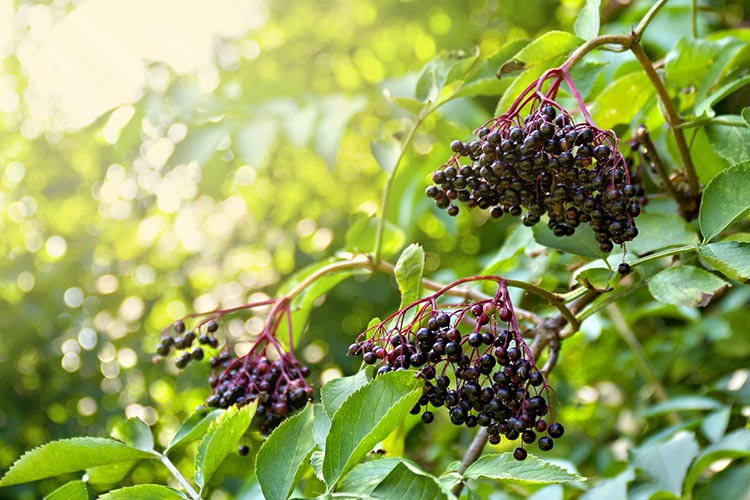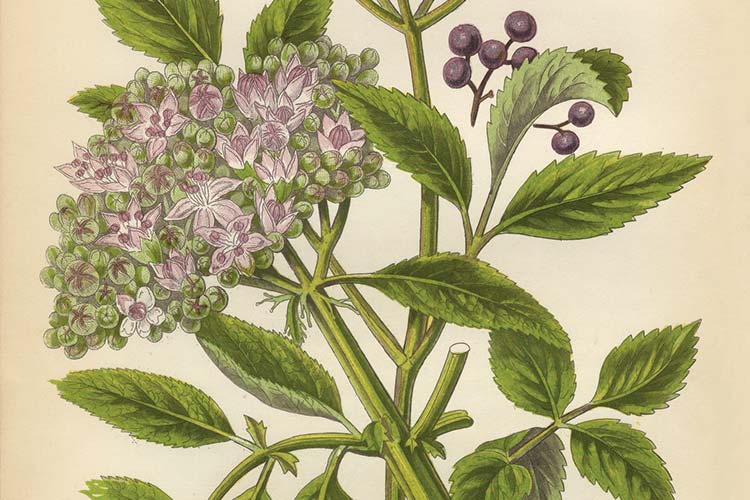March 2020 – Will Black Elderberry (Sambucus nigra) protect me from the novel coronavirus (COVID-19)?
Since the COVID-19 pandemic is still relatively new, no studies have been conducted yet that explore the effects of Black Elderberry supplementation on COVID-19 specifically. Therefore, there is no substantiation for any direct claims related to the novel coronavirus at this time. However, there are other existing studies that demonstrate the immune-boosting benefits of black elderberry and its antiviral and symptom-reducing properties against other respiratory viruses to take into consideration.
Can Black Elderberry (Sambucus nigra) boost my immune system to help me fight off pathogens?
There are several studies that demonstrate immune-boosting properties of black elderberry and this is one of its main “claims to fame.” For example, one study (Barak et al., 2002) demonstrated that treatment with black elderberry stimulated the production of inflammatory and anti-inflammatory cytokines. Cytokines are the mediators of the immune system that regulate and mediate the immune response, inflammatory reactions, wound healing, and more and they can be divided into inflammatory cytokines (such as TNF-a, IL-1B, IL-6, and IL-8) and anti-inflammatory cytokines (like IL-10). Inflammation is a healthy part of an immune response, but self-regulation with anti-inflammatory cytokines is also important to maintaining a healthy balance of immune functionality. Black elderberry demonstrated immunomodulatory activity by stimulating the inflammatory cytokines—which activates the healthy immune system to be ready to fight off pathogens—and also by stimulating anti-inflammatory cytokines. Therefore, for individuals who want to keep their immune system at its peak and ready to take on any invaders, black elderberry deserves consideration.
How does Black Elderberry help with viral upper respiratory infections (i.e. colds and influenza)?
Initial human clinical studies have indicated the antiviral benefits of black elderberry, specifically against influenza. Subjects who took black elderberry while having a confirmed influenza infection recovered about 3-4 days faster compared to subjects taking a placebo (Zakay-Rones et al., 2004). A more recent human clinical trial investigated the effects of ElderCraft® Black Elderberry extract, on long-haul flight passengers. Subjects primed the immune system by taking the ElderCraft® extract prior to the flight, and continued to take it through 5 days post-flight. The results showed a significant reduction in the duration and severity of symptoms. Getting better faster and having less severe symptoms is a consistently observed benefit of black elderberry treatment during viral respiratory infections.
Other in vitro studies have demonstrated the ability of black elderberry to inhibit influenza virus in culture (as well as bacterial respiratory pathogens) and one possible mechanism involves elderberry’s flavonoid compounds preventing the glycoprotein ‘spikes’ on the outer surface of the influenza virus from attaching to the surface of human cells to infect them. (Roschek et al., 2009)
A robust 2019 meta-analysis by Hawkins et al. quantified the effects of elderberry supplementation on upper respiratory symptoms resulting from cold/flu viruses and concluded that supplementation with black elderberry was found to substantially reduce upper respiratory symptoms.
How different is the novel coronavirus from the influenza virus?
Influenza (the “flu”) and COVID-19, the illness caused by the novel coronavirus originating from Wuhan, China, are both infectious respiratory illnesses. “The symptoms can look similar [primarily mild to severe cough, fever, body aches, fatigue], but the two illnesses are caused by different viruses,” explains Lisa Maragakis, M.D., M.P.H., senior director of infection prevention at Johns Hopkins. Coronaviruses are a large family of RNA viruses named for the glycoprotein spikes on their surface that resemble “crowns.” Coronaviruses are the second leading cause of the common cold and typically only cause mild illness. However, like influenza, they can mutate and change at a high rate, which makes detection and therapy (vaccines) difficult. But recent human coronaviruses such as SARS-CoV and MERS-CoV, and the current SARS-CoV-2 (COVID-19), which were transmitted from animals to humans, have proven to be more concerning as they can result in a more severe respiratory illness like pneumonia in high-risk individuals—similar to complications from influenza. Like influenza, the novel coronavirus appears to be predominantly spread by respiratory droplets in close contact with infected individuals. But “since this disease [COVID-19] is caused by a new virus, people do not have immunity to it, and a vaccine may be many months away,” according to Dr. Maragakis.
Whether the threat is the new coronavirus, or the existing influenza strains, the trend is the same—older and/or immunocompromised individuals, or those with pre-existing health issues are the most vulnerable. Those with strong and healthy immune systems appear to be better able to fight off the illness without severe complications. Aside from the obvious guidance of washing hands and avoiding close contact with those who are sick, it is important to keep the body in a healthy and strong state as much as possible with proper nutrition, exercise, rest, and supplementation with immune supporting ingredients—and Black Elderberry is definitely worthy of being included in that regimen.






